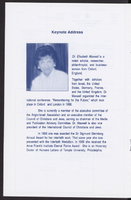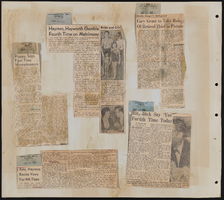Search the Special Collections and Archives Portal
Search Results
Sherwin "Scoop" Garside Papers
Identifier
Abstract
The Sherwin "Scoop" Garside Papers comprise photographs and documents of Las Vegas Review-Journal writer and photographer Scoop Garside. The collection dates from 1930 to 1983 and includes publicity photos of the Old Spanish Trail, correspondence from the Nevada State Centennial Commission, history of mines (Tonopah, Goldfield, Bullfrog), copies of articles written by Garside, family photos and general photographs of people and places, negatives of Las Vegas, Nevada; Searchlight, Nevada; St. George, Utah; and several unlabeled negatives. The 2017 addition contains newspaper clippings, a scrapbook, Nevada Historical Quarterly, and information on Nevada historic preservation. There is also genealogical information on the Garside family.
Archival Collection
Adele Baratz Papers
Identifier
Abstract
The Adele Baratz papers mainly consist of photographs documenting Adele Baratz's life in Las Vegas, Nevada from the 1930s to 2010. An essay and list of names written by Baratz's brother, Charles Salton, document the early history of the Jewish community in Las Vegas.
Archival Collection
Nan Doughty Photograph Collection
Identifier
Abstract
The Nan Doughty Photograph Collection (1870-1987) consists of approximately 960 black-and-white and color photographic prints, black-and-white photographic negatives, and black-and-white and color photographic slides, taken by Nanelia Doughty, family members, and friends.
Archival Collection
Baneberry Nuclear Test Trial Records
Identifier
Abstract
The Baneberry Nuclear Test Trial Records (1969-1989) contain documents of a federal court case regarding a 1970 Nevada Test Site nuclear test and the resultant radioactive cloud which may have exposed and subsequently injured the test site workers. The consolidated suits, William Nunamaker vs. the United States and Harley Roberts vs. the United States, came to trial January 1979, in Federal District Court, Las Vegas, U.S. District Judge Roger Foley presiding. The materials in the collection consist of court documents, such as transcripts of the trial, briefs, findings and statements, an appeal, orders, defense and plaintiff exhibits, and indices to the exhibits and witnesses as well as a glossary of terms.
Archival Collection
Regional subject files, 1859, 1908, 1970-2015
Level of Description
Scope and Contents
The regional subject files include materials collected by anthropologist Katherine Spilde about Native American gaming, Native American communities in the United States, and the US and international gaming industries. The materials date from 1859 to 2015, with the bulk of materials dating from 1990 to 2010. Materials dating from the nineteenth and early twentieth centuries are a reproduction of a federal treaty and an ethnohistorical essay. The majority of the materials document Native American gaming following the passage of the 1988 Indian Gaming Regulatory Act. The papers include research and subject files created by Dr. Spilde during her employment with the National Gambling Impact Study Commission (NGISC), National Indian Gaming Association (NIGA), and Harvard Project on American Indian Economic Development (HPAIED). The materials document Native American gaming enterprises both on and off reservations, the socioeconomic impact of gaming, the political history of gaming in the US, and international gaming. The series includes socioeconomic reports, testimonies, correspondence, memos, press releases, photographs, audiovisual materials, promotional materials, brochures, fact sheets, summaries, booklets, pamphlets, advertisements, tourism materials, journal articles, legal briefs, legislative documents, court opinions, notes, presentations, conference materials, periodicals, community newspapers, and newspaper articles.
The collection contains documentation on a number of Native American nations, including the Misi-zaaga'iganiing Anishinaabeg (Minnesota Chippewa Tribe, Mille Lacs Band); Gaa-waabaabiganikaag Anishinaabeg (Minnesota Chippewa Tribe, White Earth Band); Forest County Bodéwadmi (Forest County Potawatomi Community); Ho-Chunk Nation of Wisconsin; Mashantucket Pequot Indian Tribe; Mohegan Tribe of Indians; Tulalip Tribes of Washington; Sisseton-Wahpeton Oyate of the Lake Traverse Reservation; Standing Rock Sioux Tribe of North and South Dakota; Mandan, Hidatsa, and Sahnish (Arikara) (Three Affiliated Tribes of the Fort Berthold Reservation, North Dakota); and Mississippi Band of Choctaw Indians. Other communities are also represented in the series, but to a lesser extent. In addition to materials about gaming and casinos, Dr. Spilde also collected documents, photographs, and audiovisual materials about Native American culture in general. The series documents regional and national trends in Native American gaming, and the greater gaming industry. Materials trace federal and state relationships with individual Native American nations, specifically concerning gaming enterprises.
Archival Collection
Pagination
- Previous page ‹‹
- Page 3
Archival Component

Sandra Gray oral history interview: transcript
Date
Archival Collection
Description
Oral history interview with Sandra Gray conducted by Elsa Lopez and Barbara Tabach on December 13, 2019 for the Latinx Voices of Southern Nevada Oral History Project. In this interview, Dr. Gray discusses her family history, and describes how her parents are immigrants from Durango, Mexico and moved from East Los Angeles, California to East Las Vegas, Nevada in 1991. After getting her bachelor's degree in psychology from the University of Nevada, Las Vegas (UNLV) she started a behavioral health agency that provided rehabilitative mental health services to children primarily in the foster care system. She went on to earn a master's degree in mental health counseling, a master's in psychology, and a doctoral degree in clinical psychology. She is the founder of Empower LV, which strives for equitable access to sports and tutoring. Dr. Sandra Gray is also the owner and operator of Innovation Behavioral Health Solutions, LLC.
Text


Hernando Amaya oral history interview: transcript
Date
Archival Collection
Description
Oral history interview with Hernando Amaya conducted by Laurents Banuelos-Benitez, Marcela Rodriguez-Campo, and Barbara Tabach on October 18, 2018 and December 3, 2018 for the Latinx Voices of Southern Nevada Oral History Project. In this interview, Hernando Amaya talks about his childhood and education in Bogota, Colombia. He discusses his start in journalism as a young man and working for El Espectador, the Colombian national newspaper. He discusses his experiences reporting on the narco-terrorism occurring in Medellin, Colombia and how this eventually led to his immigration to the United States. Amaya moved to Las Vegas, Nevada in 2001 and continued his career in journalism by working for local Spanish speaking papers and websites. He relates his civic involvement in the Las Vegas area, his work as the president of the Colombian Association of Las Vegas, and various other civic engagements. As a journalist, he asserts the importance of knowing one's culture, storytelling, learning history, and being active in the community.
Text


